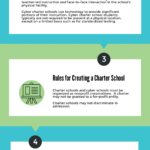Despite over 6,700 charter schools across the U.S. and almost daily news reporting, many people still do not have a clear understanding of them. A charter school is essentially a privately run but publicly funded school. Students (along with their parents) choose to attend a charter school in place of their district-assigned school. Pennsylvania charter schools are funded through tax dollars, and are not permitted to charge admission. A school’s “charter” details the school’s mission, programs, students served, performance goals and methods of assessment. Each charter is approved by at least one local school district. Charter schools have more flexibility in their operations because they are exempt from certain state requirements. However, they must meet greater academic accountability standards by demonstrating compliance in the areas of academic achievement, financial management and organizational stability. A school’s charter is reviewed periodically by the granting school district. A charter can be revoked (and the school closed) if guidelines on curriculum and management are not followed, or if the standards are not met.
The first law allowing charter schools was passed in 1991 in Minnesota. Since then, 45 states plus the District of Columbia have passed similar laws. Pennsylvania authorized charter schools in 1997, and now has 176. With more than 6% of public schools in the United States being charter schools, they are now integral to our educational system.
New Schools
For Pennsylvania charter schools in the development phase, developing a distinct, sustainable charter is the first step. Other considerations are equally important, such as the formation of a nonprofit corporation, qualifying for federal tax exempt status, understanding and complying with requirements of the Pennsylvania Charter School Law and Public School Code, drafting policies, entering into contracts and choosing the best location for the school. Once all those details are considered, it is time to submit an application.
Established and Expanding Schools
Established charter schools need continuing legal guidance. Maintaining admissions, obtaining financing for building expansions and/or new construction, lease negotiations and special education needs are just some of the areas. In addition, there are sophisticated tax, nonprofit and fiduciary duties that should be addressed and overseen by experienced legal professionals.
The Attorneys at Fitzpatrick Lentz & Bubba have extensive experience advising charter schools on a wide variety of issues. Take a look at our Charter School 101: Quick Facts infographic below for more information. Then contact Marie K. McConnell or another attorney in our Corporate, Business & Banking Group.










